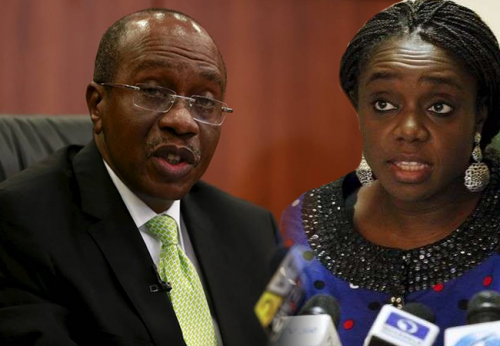In less than a week, this year will recede into history! However, Nigerians may not forget in a hurry, its impacts on the banks and the economy in general.
In fact, in some years to come, they would still remind themselves of the economy’s sluggish exit from the worst recession in decades, with 0.55 per cent growth pace, after being in the doldrums for 15 months. They would even tell unborn generations that as a result of the Federal Government’s reduced capacity to provide support to Nigerian banks in times of stress, as well as the banks’ significant holdings of government securities linking their credit profiles to that of the government, many Nigerian banks were consequently downgraded by global rating agencies.
Recession exit
The biggest news of the year was the announcement last September 5 that the nation has exitd recession. After five quarters of continuous contraction of the GDP (beginning from 2016 Q1), the economy recorded a positive growth of 1.5 per cent in 2017 Q3 vis-à-vis the negative outcomes of -1.73 per cent and -0.91 per cent in 2016 Q4 and 2017 Q1, respectively, signalling an exit from the recession.
Foreign reserves
The country’s foreign exchange reserves rose from $27.4 billion in January to $37.8 billion as of last Thursday, December 21. This shows a significant improvement in the reserves from the $23 billion recorded in October 2016.
Import bills
The policy restricting 41 items from the forex markets has been praised for causing considerable decline in Nigeria’s import bills. From an average of about $5.5 billion, the monthly import bill has fallen consistently to $2.1 billion in 2016 and $1.9 billion by half year 2017.
Doing business indicators
The World Bank’s ease of doing business indicator for 2018 showed that Nigeria, with a score of 52.03, improved 24 places to rank 145 out of 190. The establishment of the Credit Bureaus as well as the National Collateral Registry was said to have contributed in no small measure at improving access to credit and enhancing the ease of doing business in Nigeria.
Inflation
From a peak of 18.72 per cent in January, headline inflation recorded eight straight months drop, with the rate declining to 15.9 per cent in November.
Exchange rate
Significant appreciation of the naira from over N500/$1 early in the year to about N360/$1 as of today.
Forex supply
Last April, the Central Bank of Nigeria (CBN) established the Investors and Exporters (I&E) foreign exchange (forex) window. There was a significant improvement in the foreign exchange supply since then as about $10 billion was said to have been recorded in autonomous inflows through this window alone.
According to the apex bank, the purpose of the window was to boost liquidity in the forex market and ensure timely execution and settlement for eligible transactions. Eligible transactions under the window include invisible transactions such as loan repayments, loan interest payments, dividends/income remittances, capital repatriation, management service fees and consultancy fees.
Also on the eligible list are software subscription fees, technology transfer agreements, personal home remittances and any such other eligible transactions including ‘miscellaneous payments’ as detailed under Memorandum 15 of the CBN Foreign Exchange Manual.
Downgrade of Nigerian banks
Moody’s Investors Service (Moody’s) last month downgraded to B2 from B1 the long-term local currency deposit and issuer ratings of four Nigerian banks. It also downgraded the long-term local and foreign currency issuer ratings of another development bank.
The agency, in its new rating, listed the banks to include Access Bank Plc (Access), Guaranty Trust Bank Plc (GTBank), United Bank for Africa Plc (UBA) and Zenith Bank Plc (Zenith) while the Bank of Industry (BoI) was listed as the development bank.
Moody’s also downgraded to B3 from B2, the long-term foreign currency deposit ratings of Access, GTBank, UBA, Zenith, Union Bank, First Bank and Sterling Bank Plc.
In its latest rating of banks, the agency noted that the rating reflects the government’s reduced capacity to provide support to Nigerian banks in times of stress and the banks’ significant holdings of government securities linking their credit profiles to that of the government.
Subsequently, it said in its report that Access and UBA’s long-term local currency deposit ratings and BoI’s long-term issuer ratings no longer benefit from a one-notch uplift from their B2 BCAs (or standalone credit profile, as is the case for BoI) as these are now at the same level as the government bond rating.
National Collateral Registry (NCR)
On May 30, the Acting President of Nigeria, Prof. Yemi Osinbajo, assented to the Bill on Secured Transactions in Movable Assets (Collateral Registry Act) and the Credit Reporting Bill, 2017 as passed by the National Assembly Acts. The NCR is an initiative of the CBN with support from International Finance Corporation (IFC) to improve access to finance particularly for Micro, Small and Medium Enterprises (MSMEs).
The act aims to provide for the registration and regulation of security interests in movable assets by enhancing financial inclusion in Nigeria, stimulating responsible lending to MSMEs and facilitating access to credit secured with movable assets.
The Collateral Registry facilitates the use of movable/personal assets as collateral that remain in possession or control of the borrowers and thereby improves access to secured finance because movable assets/personal property often account for most of the capital stock of private firms and comprise an especially large share of MSMEs. Assets that can be used as ‘movable property’ collateral under the Collateral Registry Regulation include equipment, inventory, accounts receivable, household items, bank accounts, farm produce, motor vehicles, boats, planes, consumer goods, trees that have been severed and oil, gas or minerals that have been extracted, etc




